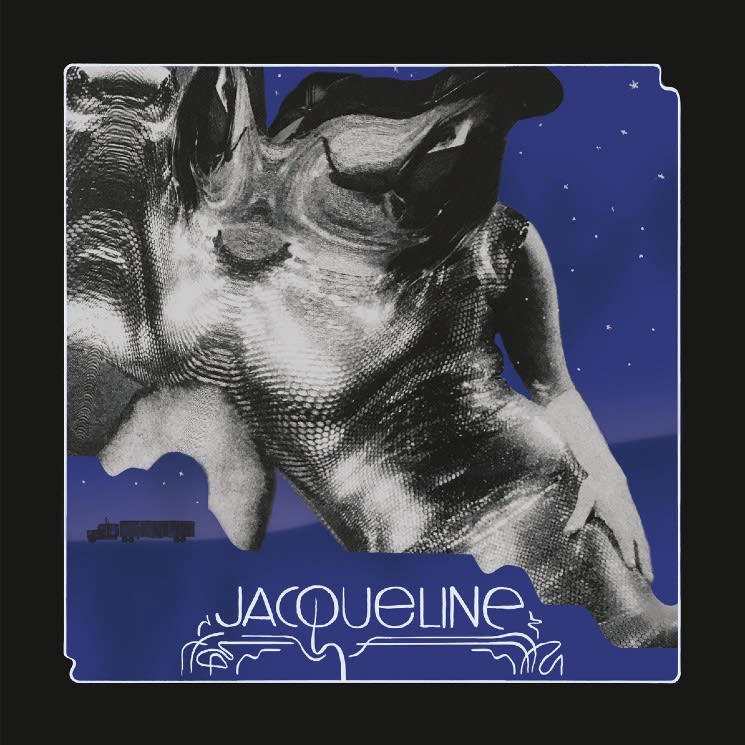The last time we heard from Jackie Lynn, the vagabond's freewheeling lifestyle may have gotten the best of her. Having climbed the ranks of Chicago's seedy underground via a multimillion-dollar drug operation, 2016's Jackie Lynn left the outlaw with love lost, cash to burn and home in the rear-view mirror. While it might behoove an unconvicted felon like Lynn to get out of plain sight, it's not too long before she finds herself under a different kind of spotlight on Jacqueline.
Jackie Lynn is an alter-ego of Haley Fohr, the "fried cocaine-country" side project designed in part to afford Fohr respite from the trenches of the more experimental, deeply personal and sometimes corrosive Circuit des Yeux. Armed with a compelling backstory, a well-defined aesthetic palette and more self-assuredness than she might otherwise feel entitled to, the Lynn persona frees Fohr to craft songs that are more story than idea, more structure than environment.
Despite the very circumscribed intentions, there's plenty on Jacqueline that evinces forward motion. The record's idea of country music, for instance, is liberal enough to pull off a kind of krautrock. Bitchin Bajas as the backing band supply plenty of crystalline synths ("Diamond Glue") and four-on-the-floor grooves ("Casino Queen") to make one wonder how Jacqueline can pivot so quickly from dusty country roads ("Traveler's Code of Conduct") to the refractive light bouncing off of a spinning roulette wheel. Maybe Lynn did what most of us do when we're trying to get liberated from our past: she hit the club, ready to dance. Standout track "Odessa" exudes that sleeker confidence, one that would have felt appropriate on the debut.
While much of the lyrics display the same heightened sense of self-empowerment, Jackie Lynn understands better than anyone that freedom is a double-edged sword. While Lynn's aesthetic development occasionally results in the project reaching pop-heights not in its reach before, it also blurs the line between this and Fohr's other projects. Lynn might even admit to as much, acknowledging how hazy things can get when "each step that you take leaves dust in its wake."
(Drag City)Jackie Lynn is an alter-ego of Haley Fohr, the "fried cocaine-country" side project designed in part to afford Fohr respite from the trenches of the more experimental, deeply personal and sometimes corrosive Circuit des Yeux. Armed with a compelling backstory, a well-defined aesthetic palette and more self-assuredness than she might otherwise feel entitled to, the Lynn persona frees Fohr to craft songs that are more story than idea, more structure than environment.
Despite the very circumscribed intentions, there's plenty on Jacqueline that evinces forward motion. The record's idea of country music, for instance, is liberal enough to pull off a kind of krautrock. Bitchin Bajas as the backing band supply plenty of crystalline synths ("Diamond Glue") and four-on-the-floor grooves ("Casino Queen") to make one wonder how Jacqueline can pivot so quickly from dusty country roads ("Traveler's Code of Conduct") to the refractive light bouncing off of a spinning roulette wheel. Maybe Lynn did what most of us do when we're trying to get liberated from our past: she hit the club, ready to dance. Standout track "Odessa" exudes that sleeker confidence, one that would have felt appropriate on the debut.
While much of the lyrics display the same heightened sense of self-empowerment, Jackie Lynn understands better than anyone that freedom is a double-edged sword. While Lynn's aesthetic development occasionally results in the project reaching pop-heights not in its reach before, it also blurs the line between this and Fohr's other projects. Lynn might even admit to as much, acknowledging how hazy things can get when "each step that you take leaves dust in its wake."
